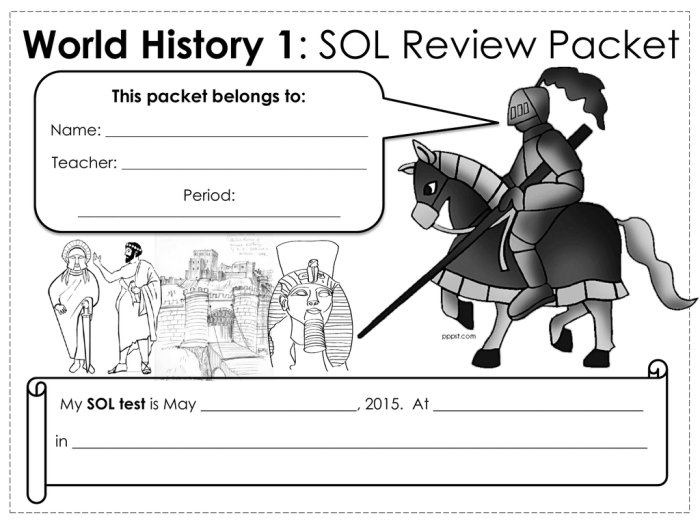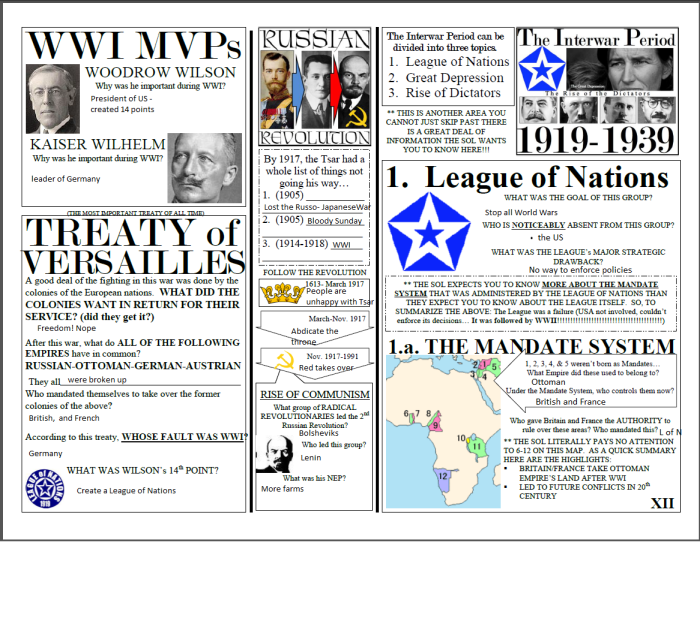Embark on a historical odyssey with the World History 2 SOL Review Packet Answer Key, your indispensable guide to unraveling the intricacies of civilizations past and present. This comprehensive resource empowers you to delve into the key characteristics, achievements, and legacies of ancient, classical, medieval, early modern, and modern civilizations, providing a profound understanding of their impact on shaping the world we inhabit today.
World History 2 SOL Review Packet Answer Key: Ancient Civilizations

Ancient civilizations emerged in different parts of the world, characterized by complex social structures, advanced technologies, and significant contributions to human knowledge. Key characteristics include:
- Organized governments and social hierarchies
- Developed writing systems
- Advanced agricultural practices
- Monumental architecture and infrastructure
- Religious and cultural beliefs
The table below compares the political, economic, and social structures of Mesopotamia, Egypt, and India:
| Civilization | Political Structure | Economic Structure | Social Structure |
|---|---|---|---|
| Mesopotamia | City-states ruled by kings or priests | Agriculture, trade, and crafts | Social classes based on wealth and occupation |
| Egypt | Centralized monarchy with a pharaoh | Agriculture, mining, and construction | Rigid social hierarchy with a priestly class at the top |
| India | Vedic period with decentralized tribal societies | Agriculture, pastoralism, and trade | Caste system based on birth and occupation |
Ancient civilizations made major contributions to world history, including:
- Development of writing, mathematics, and astronomy
- Construction of monumental structures, such as pyramids and temples
- Advancements in agriculture and irrigation
- Establishment of religious and philosophical systems
World History 2 SOL Review Packet Answer Key: Classical Civilizations

Classical civilizations, such as Greece and Rome, flourished in the Mediterranean region and had a profound impact on Western culture and thought. Key characteristics include:
- Democratic political systems in Greece and republicanism in Rome
- Advanced philosophy, literature, and art
- Scientific advancements, such as the development of geometry and astronomy
- Extensive trade networks and military conquests
The timeline below Artikels key events in the history of classical civilizations:
- 8th century BCE: Rise of Greek city-states
- 5th century BCE: Golden Age of Athens
- 4th century BCE: Conquests of Alexander the Great
- 27 BCE: Establishment of the Roman Empire
- 1st century CE: Pax Romana (Roman Peace)
- 4th century CE: Division of the Roman Empire
- 5th century CE: Fall of the Western Roman Empire
Classical civilizations had a lasting impact on Western culture and thought, including:
- The development of democratic principles
- The foundations of Western philosophy and literature
- Advancements in mathematics, science, and technology
- The spread of Christianity and other religious beliefs
World History 2 SOL Review Packet Answer Key: Medieval Civilizations
The fall of the Roman Empire in the 5th century CE marked the beginning of the Middle Ages, a period of significant change and development in Europe, Asia, and Africa. Key characteristics include:
- The rise of feudalism and the development of the manorial system
- The spread of Christianity and the rise of the Catholic Church
- The development of new technologies, such as the printing press
- The growth of trade and commerce
The table below compares the major medieval civilizations in Europe, Asia, and Africa:
| Civilization | Political Structure | Economic Structure | Social Structure |
|---|---|---|---|
| Europe | Feudal system with kings, nobles, and peasants | Agriculture and trade | Social classes based on wealth and land ownership |
| Asia | Various political structures, including empires, kingdoms, and city-states | Agriculture, trade, and manufacturing | Social hierarchies based on religion, caste, or occupation |
| Africa | Various political structures, including kingdoms, empires, and city-states | Agriculture, trade, and mining | Social structures based on kinship, ethnicity, or occupation |
World History 2 SOL Review Packet Answer Key: Early Modern Civilizations

The Age of Exploration, beginning in the 15th century, marked a period of significant change and global interaction. Key characteristics include:
- European exploration and colonization of the Americas, Africa, and Asia
- The development of new technologies, such as the compass and the astrolabe
- The rise of mercantilism and the growth of trade
- The spread of new ideas and cultural exchange
The impact of European colonization on the Americas, Africa, and Asia was profound, including:
- The displacement and enslavement of indigenous peoples
- The introduction of new diseases and technologies
- The transformation of political and economic systems
The early modern period also saw the development of new technologies and ideas, such as:
- The invention of the printing press
- The development of scientific methods
- The rise of humanism and the Renaissance
World History 2 SOL Review Packet Answer Key: Modern Civilizations
The Industrial Revolution, beginning in the 18th century, marked a period of rapid technological and economic change. Key characteristics include:
- The development of new machines and technologies, such as the steam engine and the cotton gin
- The rise of factories and mass production
- The growth of cities and the urbanization of populations
- The expansion of global trade and imperialism
The Industrial Revolution had a profound impact on society, including:
- The creation of new social classes and economic inequalities
- The rise of labor movements and social reforms
- The transformation of political and economic systems
The 19th and 20th centuries saw major social and political changes, including:
- The rise of nationalism and imperialism
- The development of new political ideologies, such as communism and fascism
- The occurrence of major wars, including World War I and World War II
- The growth of international organizations, such as the United Nations
The timeline below Artikels key events in modern world history:
- 18th century: Industrial Revolution begins in Great Britain
- 19th century: Rise of nationalism and imperialism
- 20th century: World War I, World War II, and the Cold War
- 21st century: Globalization and the rise of new technologies
Commonly Asked Questions: World History 2 Sol Review Packet Answer Key
What is the significance of Mesopotamia in world history?
Mesopotamia, the cradle of civilization, played a pivotal role in the development of writing, mathematics, astronomy, and organized society.
How did the fall of the Roman Empire impact the course of European history?
The fall of the Roman Empire led to the fragmentation of Europe, the rise of feudalism, and the emergence of new political and cultural entities.
What were the major factors that contributed to the Age of Exploration?
The Age of Exploration was driven by a combination of factors, including the search for new trade routes, the desire for wealth and adventure, and the advancement of maritime technology.
